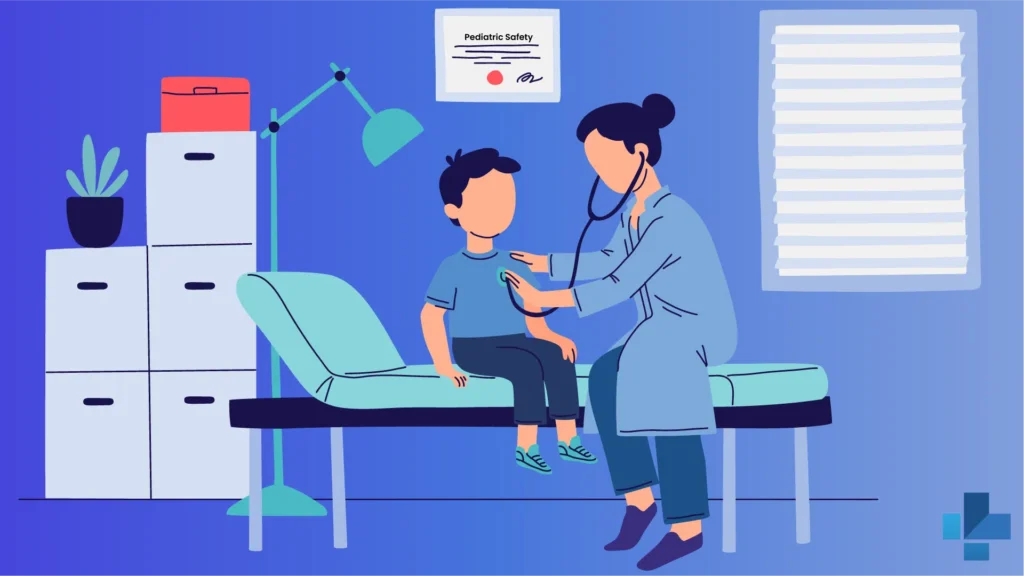Pediatric advanced life support is a popular course and can train individuals on ways to recognize an emergency situation. It is crucial for several reasons, and we will explore those in depth today. Keep reading to know the importance of algorithms and reasons to review PALS algorithms.
What is PALS certification?
PALS delivers essential care to injured infants and children. This advanced course addresses healthcare concerns for children and is different from CPR or BLS.
Here is what PALS certification includes:
- Recognize and provide the interventions required to prevent respiratory and cardiac arrest in any pediatric patient.
- Perform a systematic approach while performing assessments by using initial impressions, diagnostic tests, and assessments.
- Effective, high-quality cardiopulmonary resuscitation (CPR)
Selecting appropriate medications and electrical therapies while presented with an arrhythmia scenario. Establish rapid capsular access while administering fluids and medications.
What are the objectives of PALS certification?
These are objectives to improve pediatric patient outcomes. A PALS class will teach responses to the following scenarios:
- Shock
- Respiratory arrest
- Cardiac arrest
- Abnormal heart rhythms
Is PALS certification the right course for you?
If you want to register online, you must check whether the course is right for you or not. Before signing up online, it is a must that you complete a few courses prior to registering online. This includes a basic life support (BLS) course and an ECG/EKG course. Though these are not required, it is always recommended to complete them before PALS.
If you are eligible to sign up, it is crucial to verify whether there are training courses that may be ideal for your needs before aiming for your PALS certification. If you enroll in a PALS course without it being relevant to your training needs, you might not understand the material well and not benefit much.
You must assess whether a PALS certification is the right training for the skills that you are seeking. When it comes to obtaining emergency skills, there are several classes you can take. A PALS course is the most useful course if you want or need to respond to critical cardiopulmonary emergencies in children or infants.
What is the importance of PALS certification?
The bodies of children and infants respond differently and need distinct interventions. In life-threatening situations, health professionals must understand the best practices for treating children. Not only will you make yourself eligible for some positions that need the skills, but it will also allow you to offer lifesaving care in emergency situations. If you find yourself in a setting in which emergency cardiopulmonary incidents may occur, your knowledge from a PALS course is crucial. Having these skills makes you a capable and skilled responder.
Empowering parents in emergencies
Your home is your child’s first playground and is prone to accidents. PALS training goes beyond crisis management. By being aware of the risks at home, you can take better care of children. The fear and helplessness experienced during emergencies can be overwhelming. However, PALS certification empowers parents to respond effectively. The training offers you a systematic approach to assessing pediatric challenges and equips you with the knowledge to identify serious conditions. With this certification, parents report feeling more confident in their caregiving roles. This gives you confidence to act during emergencies.
Importance of PALS algorithms
As healthcare professionals, it is crucial to have an understanding of pediatric advanced life support (PALS) algorithms. By following the guidelines and approach, you can manage pediatric emergencies better and help save a child’s life. With a vast wealth of information, it is difficult to recall the necessary details during a stressful situation. Here are a few tips to remember PALS algorithms efficiently:
How to memorize PALS algorithms?
- Practice makes perfect: Repeated practice of each algorithm helps. Attend PALS training courses as often as possible, and practice with your teammates. Similarly, supplement your studying by learning other methods, for instance, with flashcards or simulators to help you remember. With every attempt, your confidence and readiness will increase substantially in a real-life emergency.
- Use online resources: There is a great pool of online resources through which you can dive into and get the necessary insights concerning PALS algorithms. Wikipedia articles, YouTube tutorials, online flashcards, and interactive learning platforms are good tools for visual learners. Make sure that you use credible resources that are updated.
- Medical social media groups: Facebook and LinkedIn, for instance, are social platforms that unite healthcare professionals in thousands of groups and where they engage in the exchange of helpful blog posts, professional cases, and the initiative of events and discussions of medical concepts.
Conclusion
Pediatric advanced life support (PALS) allows an individual to provide life-saving care to infants and children in cardiac emergencies. There are several career paths in which it is beneficial to have PALS certification. If you are a caregiver or a parent, you must enroll in a certification course to provide necessary care and improve patient outcomes. Review PALS algorithms well to manage pediatric emergencies better.

